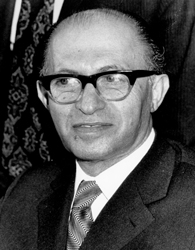Israeli Prime Minister Menachem Begin is best remembered for signing the 1978 Camp David Accords with Egyptian President Anwar Sadat, and a subsequent 1979 peace treaty between the two nations. Although he often found himself opposed by Israeli leadership, he realized his dream of a secure Israeli homeland before the end of his life in 1992.
Menachem Begin’s Early Days
Menachem Begin was born in Brest-Litovsk, Poland, on August 16, 1913. From an early age, he expressed a strong desire for the Jewish people to return to Israel. Begin joined the Hashomer Hatza’ir, “Young Guardsmen,” and then the Betar movements, both associated with Zionism.
He rapidly ascended in the organizations’ leadership. At 25, three years after receiving his law degree, he was the head of Betar in Poland, an organization with 70,000 members. “He believed fiercely, and contentiously, that the Jews had a right to a national homeland,” wrote The New York Times, and he even advocated taking it by force.
Begin was in Vilna, Lithuania, when Soviets occupied the area at the start of World War II. Soviets arrested him on charges of sabotage, accusing him of being a Zionist and a British agent.
He remained in Siberian labor camps for two years until Germany attacked Soviet Russia, and the Soviets became convinced that their political prisoners would make reliable recruits. Once freed, Begin joined the Polish Army and eventually made his way to Palestine, where he became the leader of Etzel, a militant group fighting against the British rulers for control of their homeland.
Sources in this Story
- Jewish Virtual Library: Menachem Begin
- The New York Times: Menachem Begin, Guerrilla Leader Who Became Peacemaker
- The Knesset: Menahem Begin
- The Nobel Foundation: The Nobel Peace Prize 1978
- Ynetnews News: The Lebanon War
- The BBC: Menachem Begin
- The Orthodox Union: Menachem Begin: 6th Prime Minister of Israel
Begin’s Political Career
When Israel was founded in 1948, Begin founded Herut, a right-wing political party radically opposed to the ruling Israeli Labour Party, led by David Ben-Gurion. His career “was marked by numerous, frequently quoted speeches on political and legal issues, [and] acrimonious debates” with Ben-Gurion, explains the web site of the Knesset.
After nearly 30 years as opposition leader in the Israeli parliament, he led a conservative coalition, called Likud, to an upset victory in the Knesset. On July 20, 1977, Begin became the prime minister of Israel, a position he held for six years.
His time in office is predominantly remembered by his diplomatic work with Egyptian President Anwar Sadat. In 1978, Begin and Sadat signed the Camp David Accords, which served as the basis for the Israel-Egypt Peace Treaty of 1979. Israel returned the Sinai Peninsula to Egypt in exchange for full diplomatic recognition and access to the Suez Canal.
For their work toward the goal of peace in the Middle East, Begin and Sadat received the Nobel Peace Prize in 1978. Nobel presenter Aase Lionaes declared the ceremony, “Never has the Peace Prize expressed a greater or more audacious hope—a hope of peace for the people of Egypt, for the people of Israel, and for all the peoples of the strife-torn and war-ravaged Middle East.”
The treaty did not bring about a wider peace in the Middle East, however. Instead of following Egypt’s lead, many Arab countries began to resent Egypt.
In 1982, at the behest of Defense Minister Ariel Sharon, Begin authorized an invasion of Lebanon. The Israeli public turned against Begin as Sharon’s plan to install a pro-Israeli government in Lebanon failed, and Israeli forces allowed Lebanese Christians to commit a massacre of Palestinian civilians at the Sabra and Shatila refugee camps.
The Rest of the Story
In September 1983, Begin resigned as prime minister following his wife’s death less than a year earlier. After stepping down from public service, he “spent the rest of his life in seclusion, tortured by feelings of guilt and remorse for failing his country over the Lebanon war,” writes the BBC.
On March 8, 1992, he died of heart failure at 78 years old. Many foreign dignitaries planned to attend his funeral, such as Jimmy Carter, but Begin preferred a simple Jewish ceremony. An estimated 75,000 people turned out to pay their respects.











